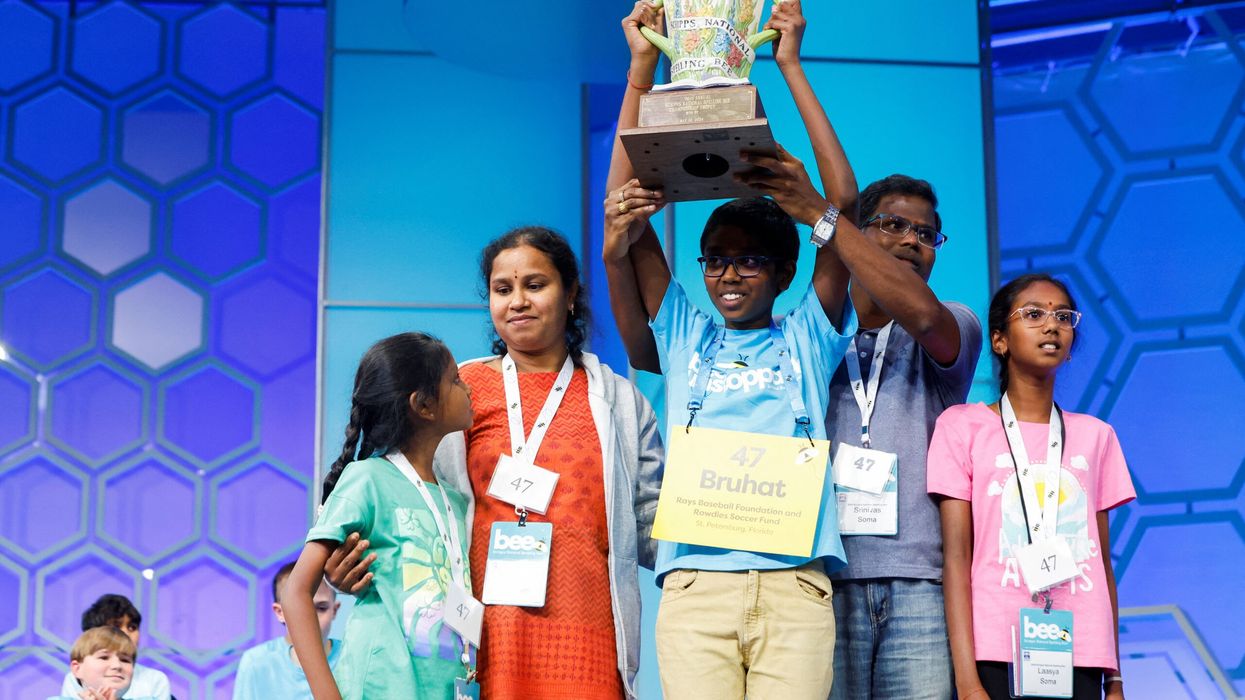BRUHAT SOMA, a 12-year-old Indian American seventh-grade student from Florida, has won the Scripps National Spelling Bee after he spelt 29 words correctly in the tiebreaker, maintaining the dominance of the children from the small ethnic community in the prestigious competition.
Bruhat emerged victorious in the Scripps National Spelling Bee on Thursday (30), earning more than $50,000 in cash and other prizes.
This year's contest came down to a tiebreaker in which Bruhat spelt 29 words correctly in 90 seconds, beating Faizan Zaki, who managed to correctly spell 20 words in the lightning round.
His championship word was “abseil”, which is defined as “descent in mountaineering by means of a rope looped over a projection above.”
Bruhat went first in the tiebreaker, and after he got through 30 words, it appeared he would be impossible to beat. Faizan's pace was more uneven at the outset. He attempted 25 words but flubbed four of them.
“Bruhat Soma rules the word! The Champion of the 2024 Scripps National Spelling Bee! The boy with the unbelievable memory doesn't miss a word all week and takes home the Scripps Cup!” the organisers said.
"Bruhat Soma correctly spelt 29 out of 30 words attempted to earn the coveted champion title and beat the standing spell-off record set by Harini Logan in 2022. Logan spelt 22 out of 26 words correctly during the competition’s first-ever spell-off."
“As the competition progressed, it was clear that Faizan and Bruhat – our final two spellers – showed up tonight ready to take down the dictionary,” said Corrie Loeffler, executive director of the Bee.
“Together, they were a powerful match. Bee officials activated the spell-off in the competition’s closing minutes, giving these stellar spellers an opportunity to show even more of what they can do."
The two final spellers each had 90 seconds to spell as many words as they could from a predetermined list of words while the other speller was sequestered.
Adam Symson, president and CEO of The E W Scripps Company, presented Bruhat with the championship trophy.
“At just 12 years old, Bruhat impressed with his display of knowledge and composure,” Symson said.
This was Bruhat’s third time participating in the Scripps National Spelling Bee. He tied for 74th in 2023 and tied for 163rd in 2022. Zaki of Allen, Texas, received $25,000.
Shrey Parikh of Rancho Cucamonga, California, tied for third place in the competition received $12,500. Ananya Prassanna of Apex, North Carolina, tied for third place in the competition and received $12,500.
Coached by 16-year-old former speller Sam Evans, Bruhat previously competed in 2022 (tied for 163rd place) and 2023 (tied for 74th place). A multifaceted person with many interests and hobbies, he had previously won the Words of Wisdom Bee and SpellPundit Bee before arriving in a Maryland suburb of Washington DC for a prestigious competition.
Bruhat's father Srinivas Soma is originally from Nalgonda in Telangana.
The 2024 Scripps National Spelling Bee had eight finalists, five of whom were Indian-Americans: Rishabh Saha, 14 and Shrey Parikh, 12, from California; Aditi Muthukumar, 13, from Colorado; and Ananya Rao Prassanna, 13, from North Carolina.
Indian-American Dev Shah won last year's Bee by correctly spelling "psammophile." Harini Logan had won the championship in 2022.
The Bee was cancelled in 2020 due to the coronavirus pandemic. There were eight co-champions in 2019, seven of whom were Indian Americans. Twenty-nine Indian-Americans have emerged as champions in the competition since 1999.
Read Also: Air India flight delayed, some passengers faint as AC was not working
In all, there were 245 spellers who came to participate in this year's competition sixty-five spellers had previously competed in the Scripps National Spelling Bee. As many as 24 spellers, mostly Indian Americans, had relatives who had participated in a combined 40 Scripps National Spelling Bees.
Four 2023 finalists advanced to the 2024 national competition: Sarah Fernandes, tied for 10th place; Aryan Khedkar tied for fifth; Tarini Nandakumar, finished ninth; and Shradha Rachamreddy, tied for third.
Aliyah Alpert and Kirsten Santos were finalists in 2022. Indian American Akash Vukoti has qualified for a record six finals in 2016, 2018, 2019, 2021, 2022, 2023.
(PTI)





